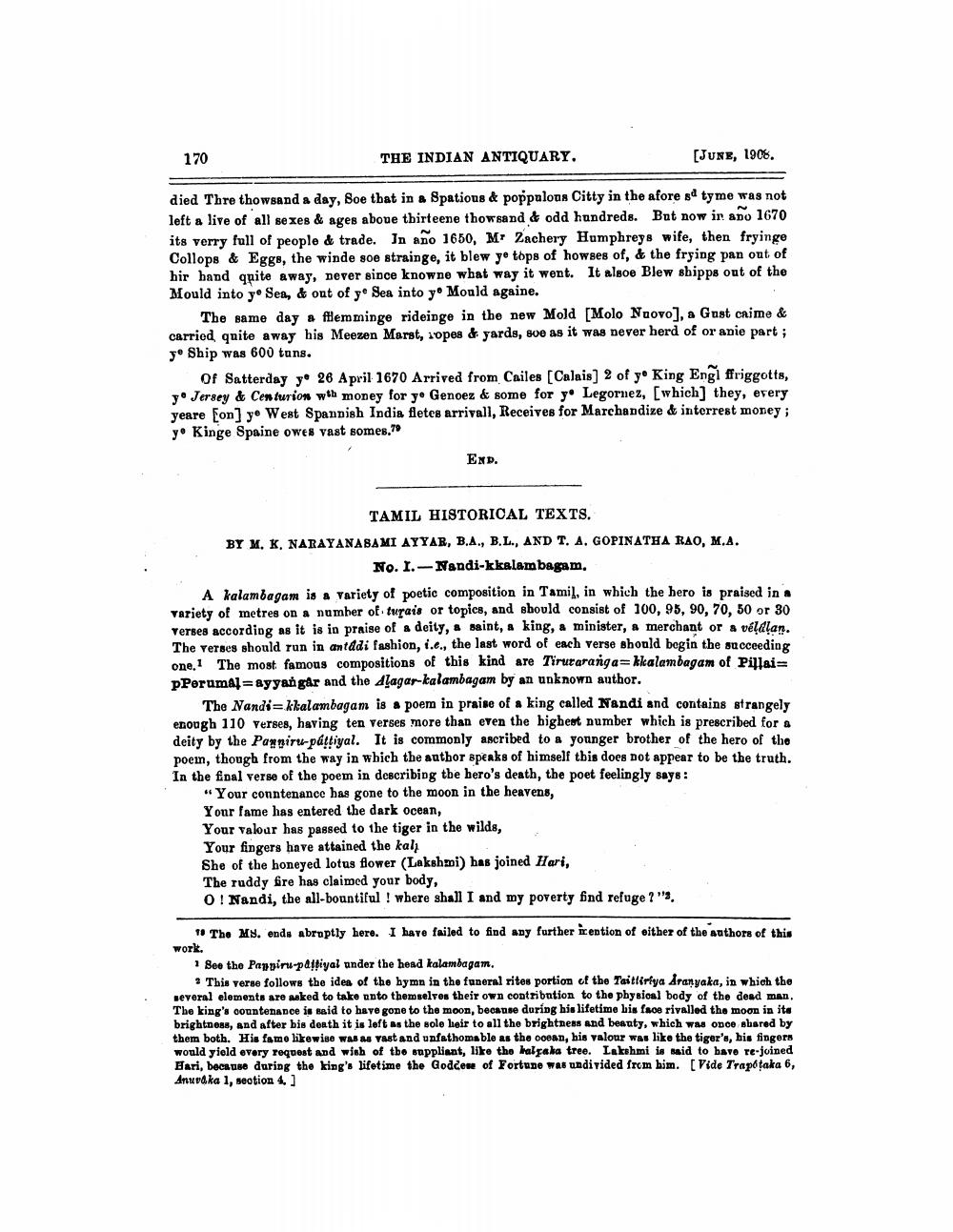________________
170
THE INDIAN ANTIQUARY.
(JUNE, 1908.
died Thre thowsand a day, soe that in a Spatious & poppulous Citty in the afore 84 tyme was not left a live of all sexes & ages above thirteene thowsand & odd hundreds. But now in ano 1670 its verry full of people & trade. In año 1650, M: Zachery Humphreys wife, then fryinge Collops & Eggs, the winde soe strainge, it blew ye tops of howses of, & the frying pan out of hir hand quite away, never since knowne what way it went. It alsoe Blew shipps out of the Mould into yo Sea, & out of ye Sea into yo Mould againe.
The same day aftlemminge rideinge in the new Mold [Molo Nuovo), a Gust crime & carried quite away his Meezen Marst, 10pes & yards, so as it was never herd of or anie part; ye Ship was 600 tuns.
Of Satterday ye 26 April 1670 Arrived from Cailes (Calais) 2 of yo King Engl ffriggotts, y Jersey & Centurion wth money for y. Genoez & some for yo Legornez, [which] they, every yeare [on] yo West Spandish India fletes arrivall, Receives for Marchandize & interrest money; yo Kinge Spaine owes vast somes.7
END.
TAMIL HISTORICAL TEXTS. BY M, K, NARAYANABAMI AYYAR, B.A., B.L., AND T. A. GOPINATHA RAO, M.A.
No. I.-Nandi-kkalembagam, A kalambagam is a variety of poetic composition in Tamil, in which the hero is praised in a variety of metres on a number of turais or topics, and should consist of 100, 95, 90, 70, 50 or 30 Verses according as it is in praise of a deity, & saint, a king, a minister, a merchant or a véldlan. The verses should run in antadi fashion, i.e., the last word of each verse should begin the succeeding one, 1 The most famous compositions of this kind are Tiruraranga=kkalambagam of Pillai= pPerumal ayyanger and the dlagar-kalambagam by an unknown author.
The Nandi= kkalambagam is a poem in praise of a king called Nandi and contains strangely enough 110 verses, having ten verses more than even the highest number which is prescribed for a deity by the Pangiru-pattiyal. It is commonly ascribed to a younger brother of the hero of the poem, though from the way in which the author speaks of himself this does not appear to be the truth. In the foal verse of the poem in describing the hero's death, the poet feelingly says:
"Your conntenance has gone to the moon in the heavens, Your fame has entered the dark Ocean, Your valoar has passed to the tiger in the wilds, Your fingers have attained the kalt She of the honeyed lotus flower (Lakshmi) has joined Hari, The ruddy fire has claimed your body, O! Nandi, the all-bountiful ! where shall I and my poverty find refuge?".
11 The My. onds abruptly here. I have failed to find any further itention of either of the authors of this work.
See the Paypiru-pattiyal under the head kalambagam.
• This verse follows the idea of the hymn in the funeral rites portion of the Taitlirlya Aranyaka, in which the several elements are asked to take unto themselves their own contribution to the physical body of the dead man,
r'countenance is said to have gone to the moon, because during his lifetime his face rivalled the moon in ita brightness, and after bis death it is left as the sole heir to all the brightness and beauty, which was once shared by them both. His fame likewise was as vast and unfathomable as the oooan, bis valour was like the tiger's, his fingers would yield every request and wish of the suppliant, like the halpaka tree. Lakshmi is said to bave re-joined Bari, because during the king's lifetime the Godcene of Fortune was undivided from him. [Vide Trapotaka 6, Anuraka 1, section 4]




